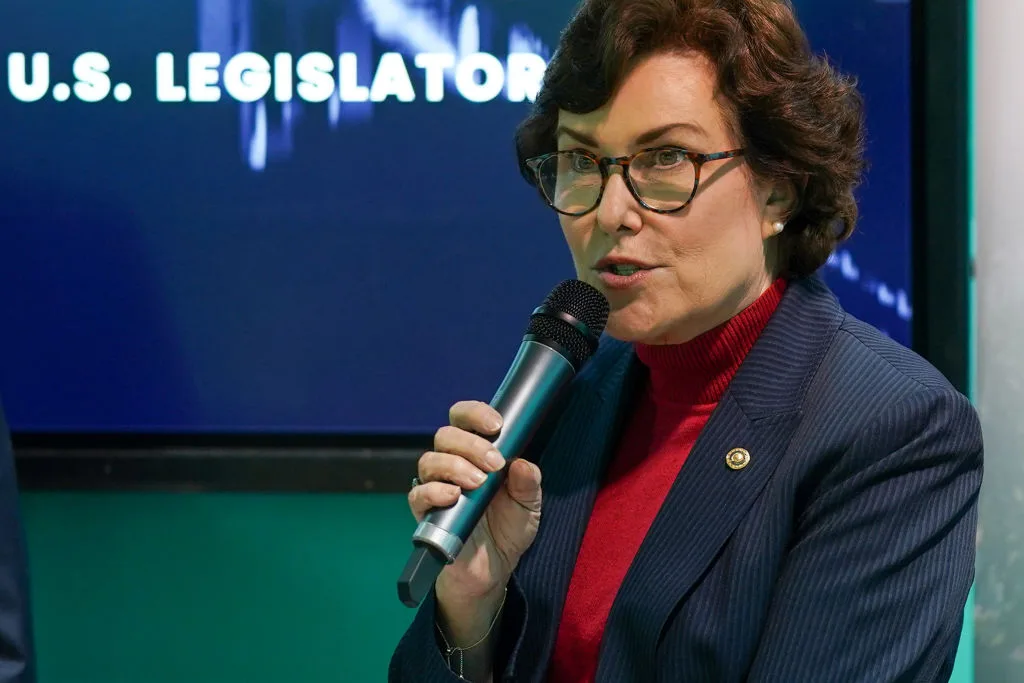
FILE - US Sen. Jacky Rosen (D-Nevada) speaks at an Atlantic Council event on day seven of the COP26 at SECC on Nov. 6, 2021, in Glasgow, Scotland. (Photo credit Ian Forsyth/Getty Images)
The bill would establish a multi-agency task force to research diagnoses and treatments sought by the children of former service members who were exposed to toxic substances during their military service
Nevada US Sen. Jacky Rosen is endorsing a proposal that would fund a first-of-its-kind study of the potential health defects of descendants of veterans who were exposed to toxic chemicals in the line of duty.
Rosen, a Democrat, is the first lawmaker to sign on as a co-sponsor to the Molly R. Loomis Research for Descendants of Toxic Exposed Veterans Act introduced March 14 by Democratic Sen. Jon Tester of Montana and Florida Republican Sen. Marco Rubio.
According to Rosen’s office, the bill would establish a multi-agency task force to research diagnoses and treatments sought by the children of former service members who were exposed to toxic substances during their military service. That research would be authorized by a working group established under the PACT Act, legislation signed into law in 2022 by President Joe Biden that expanded health benefits to generations of veterans who endured exposure to fumes created by so-called burn pits.
“As we deliver historic health care coverage for veterans who were exposed to toxic chemicals during their service to our nation, we must also look into the effects these exposures had on their children,” Rosen said in a statement Wednesday. “I’ll continue working across the aisle to make sure that we take care of our veterans and their loved ones.”
Tester’s bill was referred to the Senate Armed Forces Committee, which Rosen sits on, but has yet to receive a formal hearing.
Rosen was also a supporter of the PACT Act, which allocated roughly $800 million to help treat a variety of conditions veterans are suffering from linked to toxic chemical exposure. That bill also expanded and extended eligibility for any veteran who served from the Vietnam War era through the Gulf War and post-9/11 eras to access health care for complications linked to exposure during their service.
The US Department of Veteran affairs told Congress in 2020 that approximately 78% of all disability claims to the VA linked to toxic exposure were denied from 2007-2020. But the PACT Act also expanded a list of presumptive conditions the VA can directly link to burn pit exposure, which advocates say eliminates the lengthy—and oftentime time-sensitive—burden of veterans having to prove their affliction is a direct result of their military service.
Officials estimate upwards of 5 million veterans nationally are eligible for expanded care under the PACT Act. That figure includes roughly 100,000 veterans in Nevada, about half of the total veteran population in the state.
Veterans can find further information and check their eligibility for expanded VA benefits under the PACT Act here.

Consejos contradictorios sobre las vacunas contra covid podrían afectar las tasas de vacunación, que ya son bajas
Por Phillip Reese, KFF Health News Más de tres cuartas partes de los adultos en Estados Unidos no se vacunaron contra covid la temporada pasada y...

More than $133 million in medical debt eliminated for 128,000 Nevadans
Lee esta nota en español Did you receive a letter in the mail stating your medical debt had been eliminated? It's not a scam. Last month, Somos...

Represión de Trump empuja a inmigrantes víctimas de violencia doméstica a las sombras
Por Cheryl Platzman Weinstock Línea de ayuda nacional para casos de violencia doméstica: Las personas que han sufrido abuso doméstico pueden recibir...

Nevadans brace for 26% ACA premium surge
By January 2026, Nevadans covered under the Affordable Care Act (ACA), may see their health care premiums jump by 26%. But for many Nevadans, like...

Somos Votantes elimina $133 millones en deuda médica para 128,000 Nevadenses
El pasado miércoles, Somos Votantes Education Fund anunció que ha eliminado más de $128 millones de dólares en deudas médicas para casi 125,000...

No hay pruebas científicas de que las vacunas contra la gripe provoquen autismo
No hay pruebas científicas de que las vacunas contra la gripe que contienen timerosal representen un riesgo para la salud ni provoquen autismo...





